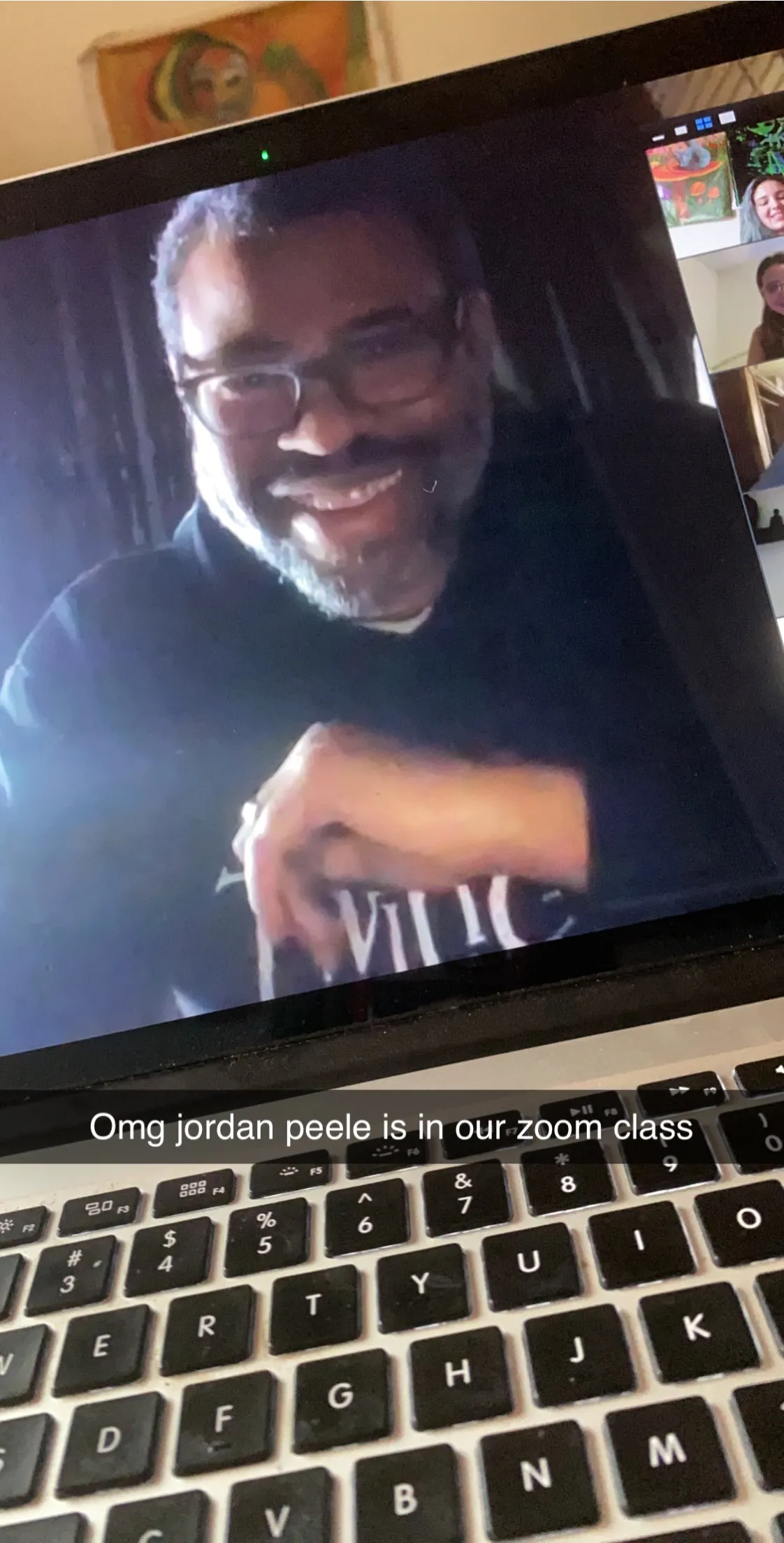
When Julian Ventura, a sophomore in ENLS 2730: Introduction to African American Literature, emailed me at 8:37AM on Saturday, April 4, and asked if we could re-open our discussion of Jordan Peele’s Get Out to “one more day, to include him,” in the conversation, my initial response was “Is this real?” Mary Pierce, also a sophomore, had the same response, when I introduced the Academy Award winner to a joint session of ENLS 2730 and AFRS 2000: Introduction to Africana Studies, on April 15. Get Out had been the adopted text the week before Spring Break, for students in both of my classes. Entry points for discussion differed, with Peele’s cinematic vision, calls-and-responses to Ira Levin’s Rosemary’s Baby and Stepford Wives, and genre-bending emerging centrally in my "African American Literature" course, and modalities of white privilege, white power, and black racial injustice shaping engagement in my "Introduction to Africana Studies" course. The joint session yielded questions as vast and diverse as Jordan Peele’s body of work, and Peele’s responses were colored by his knack for nuance and the obvious delight he takes in discussing his craft and professional journey within the television, film, and on-demand media industries.
Prior to the session, Peele and I emailed, text-messaged, and spoke a few times. Star-struck best describes my reaction to the first exchange:
Thursday, April 9, 2020, 1:42PM, Peele to Lewis: “Jordan Peele here, I know you probably got a heads up, but I’m available to talk to your class next week! Might I have your phone number so I can reach out and we can arrange? JP.”
Thursday, April 9, 2020, 1:42PM, Lewis to Peele: “Hello, Mr. Peele! Such a pleasure to be in touch. My cell is 504-xxx-xxxx. I look forward to speaking at your convenience and am so excited that the students will have the opportunity to virtually meet & engage with you!”
Anyone who knows me well knows that on Saturdays between the hours of 2PM and 6PM, from late February through early June, I am generally unavailable to go anywhere, except my backyard patio, and to do anything except eat boiled crawfish, corn, and potatoes, and listen to The Best of Michael Franks: A Backwards Glance, with a bottle of Heineken. That ritual was broken at 4:05PM, Saturday, April 11, with the arrival of the following text message: “Hey, Professor Lewis, do you have a couple of minutes? It’s Jordan Peele.” After speaking with Peele for just under two hours, I was no longer star-struck. I was, rather, tremendously warmed by the synergy that emerged during our conversation between my appreciation of Peele as the creative genius behind Get Out, Us, Key & Peele, and The Last O.G. and my newfound recognition of him as a compassionate artist, one who cares deeply about the impressions that his works make, especially on young people.
"I dare them to tell me I can’t do it." - Jordan Peele describing his approach to creating Get Out .
We discussed my approach to teaching Get Out in my Introduction to African American Literature class. I shared with him that I was also teaching the film in my Introduction to Africana Studies course. I expressed how much I valued the time he was willing to give, while hinting that a joint meeting of my classes would likely yield robust dialogue about his work, because of the diverse makeups, backgrounds, and majors of the students that comprise the two classes. Peele graciously agreed to extend the session from the originally planned fifty minutes to ninety minutes, so that he could meet with both classes. By the end of our conversation, it was apparent that having the opportunity to speak and engage with my students meant just as much to Peele as giving the students the opportunity to engage with him meant to me.
Peele entered the conference promptly at 3:00PM. Ninety minutes of questions and answers followed. There were no breaks in the questions, no hesitations or guarded responses, and no awkward silences. Quite a few moments prompted introspection. Student Emma Schreier shared that her initial identification with “Rose” as a presumptively progressive white female, caused her to question her “wokeness” by the film’s end and to re-examine the assumptions she brought to her understanding of Rose’s character development, upon viewing Get Out a second time. Additionally, student Spencer Toomer said he appreciated the explanations that Peele provided for some of the choices he made in the film’s narrative structure. In interviews, Peele has often discussed the decision he made to replace the original ending of Get Out, which results in “Chris” going to jail, with the fairy tale ending that has “Chris” and “Rod” emerge as heroic figures who triumph over the Armitage’s and their cult. In response to several students’ questions about that decision, Peele expounded upon his vision for a better criminal justice system and improved race relations in America.
The entire time with Peele was great, but if I had to say what I valued most, it would be the time he spent talking to students with connections to the arts about their professional aspirations. In addition to winning the Academy Award for Outstanding Original Screenplay for his work on Get Out, Peele was nominated for an Academy Award for Best Picture, for producing BlackkKlansman (which was directed by Spike Lee); and he is the recipient of an Emmy Award for Outstanding Variety Sketch Series (for his work on Key & Peele); and NAACP Awards for outstanding directing and writing for Get Out and outstanding writing for US. Peele was, thus, able to engage students with interests in acting, producing, directing, and writing, from the perspective of a highly experienced (and accomplished) artist with both the small and big screens.
When asked how he negotiates fears of failure or barriers created by race in the industry, Peele responded by describing his approach to creating Get Out: “I kept telling myself, ‘I dare them to tell me I can’t do it’. And when I did it, everything afterward was, ‘there is nothing I can’t do.’” In teaching, I try to leave my students with words that constitute a variation on this theme, especially when each semester comes to an end. I am eternally grateful that Spring 2020 left me and my class with these inspiring thoughts, courtesy of Jordan Peele.

Nghana Lewis is an Associate Professor of English and Africana Studies; a faculty affiliate of the School of Law; and an adjunct professor with the Department of Psychology. She has published and lectured widely on her research, which cross-sectionally studies HIV/AIDS, hip hop culture, and black women's health. Professor Lewis has been recognized for her professionalism and community involvement, receiving the Roddy Richard Lifetime Achievement Award for her commitment to serving Louisiana youth, in 2008, and the Suzanne & Stephen Weiss Presidential Fellowship for outstanding undergraduate teaching at Tulane, in 2010. In 2013, Professor Lewis was named a Top Female Achiever by New Orleans Magazine.

